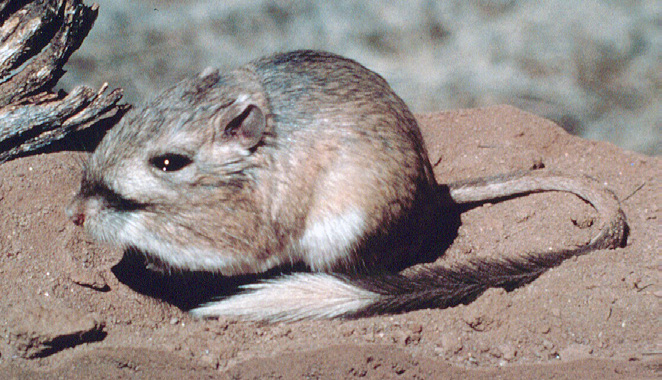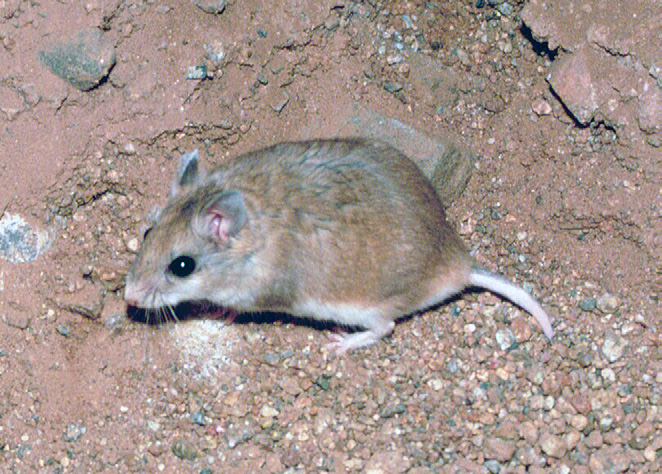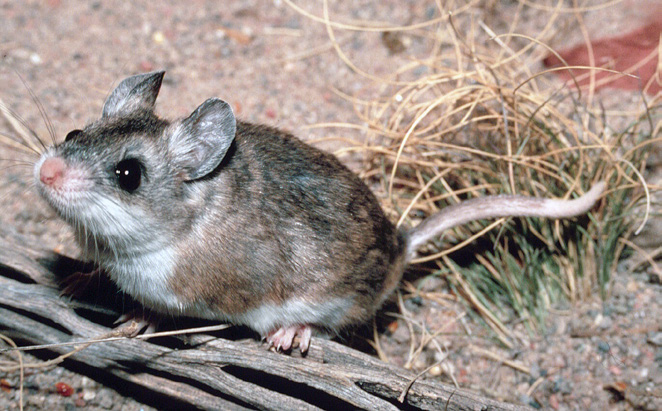Kangaroo Rats: Dipodomys, Pack Rats: Neotoma, Grasshopper Mice: Onychomys
1/43
There's no tags or description
Looks like no tags are added yet.
Name | Mastery | Learn | Test | Matching | Spaced | Call with Kai |
|---|
No analytics yet
Send a link to your students to track their progress
44 Terms
Dipodomys spectabilis and D. merriami
The two species generally studied are Dipodomys
spectabilis (Bannertail kangaroo rat) and D. merriami
(Merriam’s kangaroo rat). Dpo / stands on two feet
What is the family of Heteromyidae?
Kangaroo rat

What species is this?
Dipodomys spectabilis, kangaroo rat
What is the long tail for in the kangaroo rat?
The tail is longer than the head and body and
serves as a balancing organ in locomotion and as a
prop when standing.
What anatomical feature of Dipodomys is unique amongst Heteromyadae?
Dipodomys are unique in the Heteromyidae
because their cheek teeth grow throughout life; the
cheek teeth of other genera of Heteromyidae do not.
What do geomyidae and heteromyidae have in common regarding their cheek pouches?
They are fur lined
Where are kangaroo rats endemic to?
North America
What are kangaroo models for?
Kangaroo rats have been used extensively in the study
of renal physiology and water conservation.
been used in investigations
looking at disuse osteoporosis
evolutionary neuroanatomy
decompression sickness
climate change
as biosentinels for environmental contamination by mining operations
Kangaroo rats and goats are what similar models for?
decompression sickness
Is the dorsal gland on kangaroo rats androgen dependent or independent?
The dorsal gland, a prominent
androgen-independent, oil-secreting gland, is present on
the back between the shoulders of males and females
Activity, estrus, gestation and need to drink water for kangaroo rats?
Diurnal, seasonally polyestrus, 29-33 day gestation, do not
recommend ad libitum water, as some kangaroo rats
become addicted to drinking and develop a diabetes
insipidus-like syndrome. Gestation lasts approximately
29–33 days.
Are kangaroo rats easy to breed?
No very territorial and difficult to breed in the laboratory because of
their aggressive nature toward one another. However,
they are not aggressive toward humans. During periods of
nonreceptivity, female kangaroo rats are extremely
aggressive toward males and will frequently attack
and sometimes kill cage mates
Diets of kangaroo rats?
The diet in the laboratory is usually grains
and seeds with lettuce as a source of water
What do kangaroo rats and chinchillas have in common for husbandry practices?
require dust baths
Should you restrain kangaroo rats by the tail?
Nope tend to break off
Which mammals need dust baths?
Kangaroo rat
Chinchilla
Grasshopper mouse
Degu
Japanese Quail
Gerbils
sand rats
What type of degenerative disease do kangaroo rats get and what other rodent is this similar to?
Kangaroo rats develop spongiform degeneration of
the central auditory system, particularly in the cochlear
nucleus and auditory nerve root. The lesions are similar
to that seen in the Mongolian gerbil.
What happens when kangaroo rats are exposed to modest levels
of low-frequency noise <75 dB SPL?
Kangaroo rats develop spongiform degeneration of
the central auditory system, particularly in the cochlear
nucleus and auditory nerve root.
Neotoma floridana
Allegheny wood rat or pack rat
Neotoma albigula
white throated wood rat
Neotoma mexicana
Mexican wood rat
Neotoma cinerea
bushy-tailed wood rat
Neotoma fuscipes
dusky footed wood rat
Common research uses for pack rats (Neotoma):
Wood rats have been used in behavioral and neurological
studies (Towe and Harrison, 1993; Williams,
1980). Additionally, their role as reservoirs for a variety
of zoonotic disease agents has been examined, including
endemic murine typhus (Rickettsia typhus) (Worth, 1950),
trypanosomiasis (Chagas disease) (Charles et al., 2013),
Bartonella spp. (Morway et al., 2008), and Leishmaniasis
(McHugh et al., 1996). Wood rats have been identified as
mammalian hosts for plague (Yersinia pestis) in British
Columbia and California (Davis et al., 2008; Lewis, 1989;
Mian et al., 1996). N. fuscipes is an important mammal reservoir
of Lyme disease (Borrelia burgdorferi) in California
and Oregon (Burkot et al., 1999) and of human granulocytic
ehrlichiosis (Ehrlichia phagocytophila).
Sin nombre virus (hantavirus) has been identified in four
species of Neotoma.
What 3 species have a hemorrhagic factor that makes them more immune to western rattle snake venom?
An antihemorrhagic factor in the serum of N. micropus
against western rattlesnake venom has been identifie
and found similar to that in hispid cotton rat (Sigmodon
hispidus) and in opossum (Didelphis virginiana) sera
Activity, estrus, social structure, gestation or neotoma spp?
nocturnal, breed all year long, solitary animals, gestation length is 30 - 40 days
Do pack rats carry young on nipples and in general what is the anatomic characteristic of pups that enable nipple attachement in certain rodents?
The incisor teeth of nursing pups
are laterally divergent for the first 2 weeks of life, and
the mother’s nipple fits into the gap
Diet of neotoma spp.
In captivity, wood rats can be successfully maintained on standard laboratory rat diets fed fresh fruits and vegitabbles as well
How should neotoma get their hydration?
ad libitum water
Onychomys torridus and O. leucogaster
Grasshopper mice
Which rodent is carnivorous?
grasshopper mouse

What species is this?
Onychomys leucogaster

What species is this?
Onychomys torridus
How do you differentiate O. torridus from O. leucogaster? What is an anatomic characteristic they share but is distinctive within Onychomys?
The dorsal coat of O. torridus is gray and of O. leucogaster, brown. Both species have white ventral fur and distal tail tips
Are grasshopper mice aggressive?
Captive individuals of the same sex are very
aggressive to one another, often fighting to the death
Research uses of grasshopper mice?
Because of their aggression, they are used in behavior studies. These have included studies on predatory behavior (McCarty et al., 1976);
sex differences in behavior, activity, and discrimination
learning (Kemble and Enger, 1984); and drug effects on
aggression (Cole and Wolf, 1970). Grasshopper mice
have also been used to investigate Lyme disease (Borrelia
burgdorferi) transmission via urine (Czub et al., 1992) and
the effect of photoperiod and melatonin on seasonal
gonadal cycles (Frost and Zucker, 1983).
Grasshopper mice have been used to examine comparative
antibody formation (Lochmiller et al., 1991),
cancer induction (Dewsbury and Jansen, 1972; Taylor
et al., 1993), and population dynamics using DNA and
mitochondrial analysis (Alexander and Riddle, 2005;
Riddle et al., 1993; Sullivan et al., 1996).
Grasshopper mice are an alternate host to prairie dogs
(C. ludovicianus) for the plague bacillus Yersinia pestis
Activity, estrus, weaning, and gestation of grasshopper mice?
Females have a 5- to 7-day estrous cycle,
and gestation lasts 26–37 days, nocturnal, weaned at 3 weeks
Do grasshopper mice require dust baths?
yes
The midventral sebaceous gland is larger in the male or female?
Male
What are O. torridus resistant too because of their diet
scorpian venom
Diet of grasshopper mice?
but the main diet consists of grasshoppers,
beetles, and small vertebrates, including other rodents.
What species can you cross-foster grasshopper mice with?
Southern grasshopper mice can be
successfully cross-species fostered on white-footed mice
(Peromyscus leucopus
Are grasshopper mice more sensitive or resistant to the plague?
One of the O. leucogaster populations was associated with a known epizootic focus of the disease and was nearly 2000 times more resistant to mortality than were members of another population from an area historically free of plague
What idiopathic condition are grasshopper mice prone to, similar to the mongolian gerbil?
idiopathic seizures